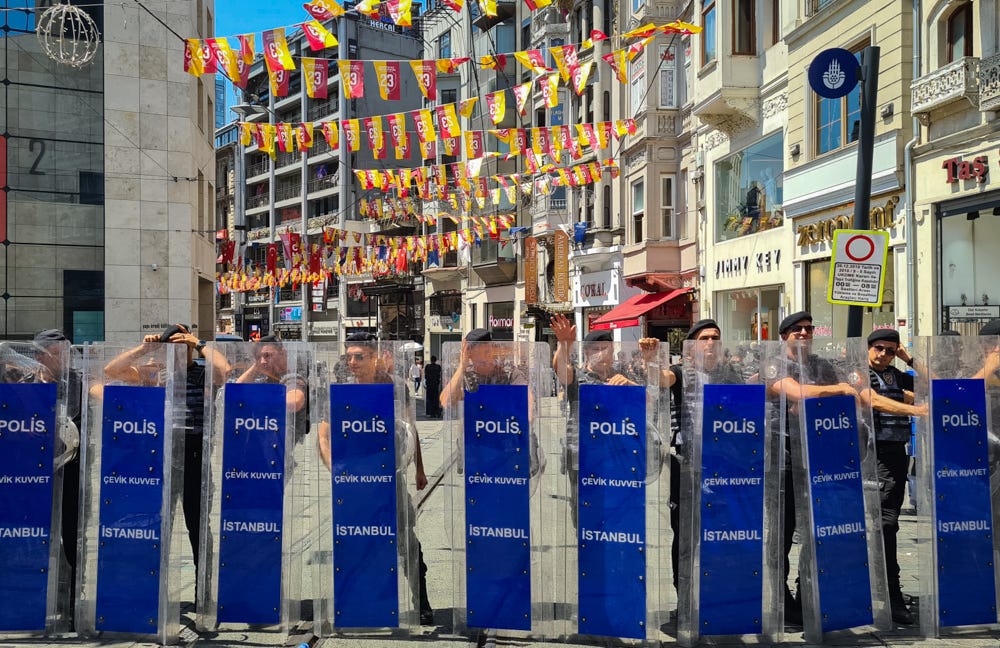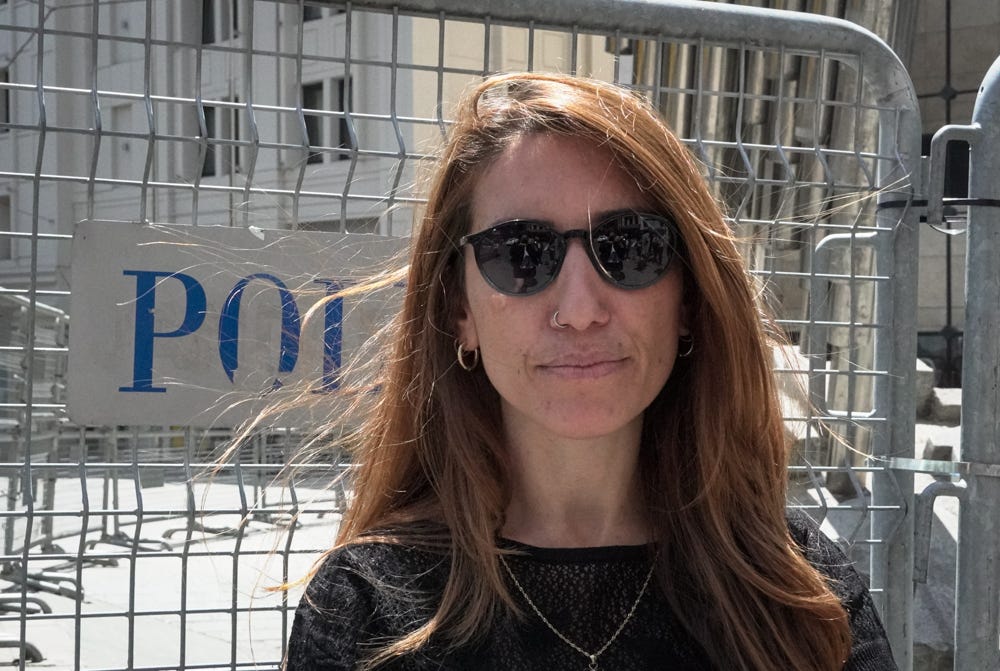İSTANBUL – "When we first went to Galatasaray Square, we were all in a great uncertainty, a void. We wanted our loved ones who were disappeared in custody to be safely returned to us. When we came together, we turned our despair into hope, our wait into a search. We have kept asking persistently, and now we have reached 1000 weeks.”
These are the words of Maside Ocak, whose brother Hasan Ocak was detained in İstanbul on Mar. 21, 1995. Fifty-five days later, his body was found bearing signs of torture in a cemetery for the unclaimed.
Maside is one of hundreds of people in Turkey who are seeking justice for disappeared loved ones.
Saturday, May 25, 2024, marks the 1000th week of the Saturday Mothers protest in İstanbul, where people like Maside will gather once more to share, along with traumas and hopes, their struggle for answers.
Rights group estimate at least 757 people were disappeared in Turkey after being taken into state custody between 1980 and 2000. In 1994 alone, at least 299 people vanished in this way.
"It is a burial place"
Hasan Ocak was last seen at the Anti-Terror Branch. After his whereabouts were known, families of the enforced disappeared came together at the Human Rights Association (IHD).
Inspired by the Mothers of Plaza Del Mayo in Argentina, the families in Turkey decided to hold a sit-in with the photos of their loved ones at Galatasaray Square on İstanbul’s İstiklal Avenue.
Describing the significance of the protest location, Maside Ocak said, “It is not just a square. It is a burial place created through struggle for our dead without graves, for our lost ones.”
The first sit-in took place on Saturday, May 27, 1995, marking the beginning of Turkey's longest-running protest. The relatives of the disappeared made their demand very clear: “You took them alive, we want them back alive.”
Gülseren Yoleri, head of the İstanbul Branch of IHD, said the slogan carries deep meaning for protest participants.
“Because it was possible for every detained person to return alive, it was important to create public awareness for this,” Yoleri told Turkey recap.
Three years after the Saturday Mothers’ first sit-in, the number of enforced disappearances began to decrease.
The protest continued uninterrupted for 200 weeks until Mar. 13, 1999, when the gatherings were suspended due to police crackdowns and violence.
"Detained just for filing petitions"
The families repeatedly attempted to lodge complaints but were rejected until 2009, when then-PM Recep Tayyip Erdoğan had direct confrontations with military ranks, which have historically tampered with politics since the foundation of the Republic. The confrontation led to investigations into military actions that amounted to crimes against the state.
One such investigation involved the 1995 disappearances of seven civilians in Dargeçit, Mardin. The case later became known as the Dargeçit JİTEM Case. Ten villagers, including four children, were detained in Dargeçit, Mardin on Oct. 28, 1995, but only three survived while the rest vanished.
Hazni Doğan, who was 11 years old when he was detained and tortured along with his brother and relatives, recalls the change in 2009.
"Previously, we were being detained just for filing petitions. But this time, our petition was processed,” Doğan said.
Finding his brother’s bones
As part of the Dargeçit investigation, a series of searches were conducted in wells in the rural areas of Mardin. In 2013, Hazni Doğan found the bones of his brother Seyhan Doğan, who was 13 when he disappeared 18 years earlier. The bones of other people were found at the same site.
The Dargeçit JİTEM Case, which included Mardin gendarmerie commanders, began 20 years later on Oct. 1, 2015 only to result in acquittals when Erdoğan, now president, settled his matters with the military.
Hazni’s family continued their vigil at Galatasaray to demand accountability.
The second generation
Also in 2009, the Saturday Mothers protest returned to Galatasaray Square. The children and siblings of the disappeared had grown by then and joined the vigil. The group then renamed itself as the Saturday People.
Besna Tosun is daughter of Fehmi Tosun, who was detained on Oct. 19, 1995, in Avcılar, İstanbul, and was never found.
“There is no trace of my father being alive, nor any evidence of his death,” Besna told Turkey recap.
“We have lived with this uncertainty for 29 years,” she added, calling it a form of “torture.”
Erdoğan and broken promises
As a result of the years-long struggle of the Saturday Mothers, Erdoğan agreed to meet with the Saturday Mothers on Feb. 5, 2011.
Four days later, following Erdoğan’s instructions, a sub-parliamentary commission was established under the Human Rights Inquiry Commission of the Turkish Parliament to investigate the fate of those who disappeared in custody.
Faruk Eren, the brother of Hayrettin Eren, who went missing after being detained on Nov. 21, 1980, reflected on the period of increased involvement from the ruling Justice and Development Party (AKP).
“The AKP looked at the Saturday Mothers according to the conjuncture of the time,” Eren told Turkey recap. “They said they would find a solution because they claimed they were settling accounts with the old state.”
The threat of impunity
Years later, the 700th gathering of the Saturday Mothers on Aug. 25, 2018, was prevented through violent police intervention.
The next day, then-Interior Min. Süleyman Soylu said, “Should we have turned a blind eye to the exploitation of motherhood by a terrorist organization and its use as a cover for terrorism?”
With the policy change, the reports prepared by the parliamentary sub-commission were ignored and the work was shelved.
As with Dargeçit JİTEM Case, local and regional courts swiftly acquitted all the military personnel involved in the disappearances.
Abdülaziz Altınkaynak, the father of 14-year-old Davut Altınkaynak, who disappeared in Dargeçit, says his family was “shocked” by the decision.
Altınkaynak had also retrieved his son Davut’s bones from a well and said his wife, Hayat, last saw their son in state custody.
“We have been searching for justice for 25 years, but there is no justice in Turkey,” Altınkaynak said. “In the past, the courts would not accept our petitions. Today, they are trying to exonerate the murderers.”

Constitutional Court ruling
As enforced disappearance cases faltered, Saturday Mothers/People were detained during the 700th week, including Besna Tosun, Faruk Eren and Maside Ocak, for “violating the law on meetings and demonstrations.”
They were charged despite the Constitutional Court’s ruling that the police intervention violated the right to peaceful assembly and demonstration. Subsequently, the Saturday Mothers were repeatedly detained every week until Nov. 11, 2023.
“Turkey is not a state governed by the rule of law,” Besna Tosun said, referring to the acquittal of the perpetrators and prosecutions of the victims’ families.
“Intimidating the entire society”
Mümtaz Murat Kök monitored the Saturday Mothers' protests on behalf of the Human Rights Foundation of Turkey (TİHV). He describes harsh police responses to the protest as “torture.”
“Torture and other ill-treatment were not only aimed at deterring and intimidating the Saturday Mothers but also at intimidating the entire society,” Kök told Turkey recap.
With the appointment of former İstanbul Gov. Ali Yerlikaya as Interior Minister after the 2023 general elections, there was a change in the approach towards the Saturday Mothers.
Following meetings with Yerlikaya and the current İstanbul Gov. Davut Gül, the Saturday Mothers were permitted to make statements and leave carnations in Galatasaray Square with a “10-person delegation.”
“Allowing a 10-person delegation does not mean the Constitutional Court’s decision is being implemented,” Besna Tosun noted.

29 years, 1000 weeks
In the 1000th week of their protest, the Saturday Mothers will once again be at Galatasaray Square to voice their unchanged demands over the past 29 years:
The disclosure of the fate of those who disappeared in custody and bringing those responsible to justice.
The inclusion of the act of "disappearance in custody" in the category of "crimes against humanity" in the Turkish Penal Code, thus removing the statute of limitations.
The signing of the International Convention for the Protection of All Persons from Enforced Disappearance, which obliges state parties to assure non-repetition of such acts.
In addition to the relatives of the disappeared, many people, politicians and notable figures are expected to join the protest on Saturday, May 25, 2024.
Main opposition Republican People’s Party (CHP) head Özgür Özel stated he would “support it with a large turnout,” calling for the “removal of the barriers of shame around the Saturday Mothers.”
“Empathize with those who suffer, not those who cause suffering,” Özel added.
This newsletter is supported by readers via Substack and Patreon. Paid subscribers get full access to our recaps, reports, members-only Slack and news tracking tools. All proceeds go towards sustaining our journalism.
Turkey recap is produced by the Kolektif Medya Derneği, an İstanbul-based non-profit association founded by our editorial team to support and elevate news media and journalists in Turkey. Contact us: info@turkeyrecap.com
Diego Cupolo, Editor-in-chief @diegocupolo
Gonca Tokyol, Editor-at-large @goncatokyol
Ingrid Woudwijk, Managing editor @deingrid
Verda Uyar, Digital growth manager @verdauyar
Emily Johnson, Deputy editor @emilyjohnson
Damla Uğantaş, Tr Türkçe editor @damlaugantas
Onur Hasip, Economy reporter @onurhasip





